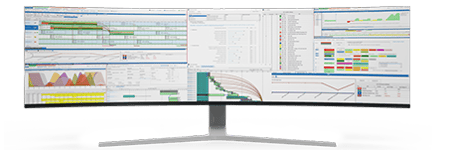Agile Operations Management in Medical Manufacturing
Medical manufacturing facilities are under constant pressure to meet growing demand, adapt to regulatory changes, and maintain strict quality standards. For Operations Directors, achieving optimal efficiency while maintaining agility is no easy feat. Agile operations management has emerged as a powerful framework to navigate these challenges, helping medical manufacturers respond quickly to changing market dynamics and regulatory demands. A key enabler of this agile approach is technology integration—particularly, platforms like PlanetTogether combined with powerful ERP systems such as SAP, Oracle, Microsoft, Kinaxis, and Aveva. Together, these systems allow Operations Directors to streamline processes, boost efficiency, and enhance decision-making, ultimately driving agility across the entire manufacturing operation.

The Need for Agility in Medical Manufacturing
Medical manufacturing facilities face unique operational challenges, such as stringent regulatory requirements, high standards for product quality, and complex production processes. Agility in this context means being able to quickly adapt to changes in demand, respond to regulatory updates, and address quality concerns in real-time. Traditional manufacturing models, which often rely on rigid, linear workflows, can make it difficult to respond rapidly. Agile operations management, on the other hand, promotes flexibility, responsiveness, and continuous improvement.
The benefits of agile operations management for medical manufacturers include:
Improved responsiveness to market shifts, regulatory changes, and customer demands.
Enhanced collaboration between departments, leading to smoother workflows and fewer bottlenecks.
Better alignment between production and supply chain activities, resulting in minimized downtime and reduced costs.
By adopting agile practices, Operations Directors can better prepare their facilities to adapt to changes without sacrificing quality or compliance.
![]()

The Role of Integrated Systems in Enabling Agility
For agility to be feasible, real-time data visibility, seamless collaboration, and dynamic scheduling are essential. Here’s where integrating PlanetTogether with ERP solutions like SAP, Oracle, Microsoft, Kinaxis, or Aveva comes into play. These systems provide a unified, data-driven platform that brings together production planning, resource scheduling, inventory management, and quality control—essentially creating an end-to-end solution that enables agile operations.
Enhanced Production Scheduling and Resource Allocation
In agile operations, scheduling needs to be flexible enough to accommodate shifts in demand or unexpected disruptions. By integrating PlanetTogether with SAP or Oracle, for instance, Operations Directors gain access to advanced production scheduling capabilities that dynamically allocate resources based on real-time data. PlanetTogether’s finite capacity scheduling algorithms can adjust schedules in response to changing demands, while ERP systems provide comprehensive visibility into inventory levels, procurement statuses, and workforce availability.
This integration enables:
Dynamic adjustments to production schedules in response to real-time data, minimizing downtime.
Efficient resource allocation, ensuring that machines and labor are utilized to their fullest potential.
Enhanced visibility into operational performance, allowing quick identification and resolution of potential bottlenecks.
Streamlined Inventory and Supply Chain Management
Agile operations rely on effective inventory management to avoid stockouts and reduce excess inventory, which can tie up capital and storage space. Integrating PlanetTogether with ERP systems like Kinaxis, known for its strong supply chain capabilities, enables medical manufacturing facilities to synchronize production schedules with supply chain activities. By leveraging real-time data from both systems, Operations Directors can make informed decisions about material purchases, reorder points, and supplier management.
With this integration, operations teams can:
Reduce lead times by ensuring raw materials are available when needed, minimizing waiting times in production.
Optimize inventory levels, reducing the need for excess stock and avoiding costly stockouts.
Improve supplier collaboration, allowing for better forecasting and planning to avoid unexpected disruptions.
Real-Time Quality Control and Compliance Management
In medical manufacturing, quality control is critical—not only for maintaining product integrity but also for meeting regulatory requirements. Integrating PlanetTogether with Aveva, which specializes in engineering and operations software, allows Operations Directors to embed quality control directly into the production process. With this setup, quality checks are not an afterthought but an integral part of every production phase, enabled through real-time monitoring and data analytics.
The benefits of this integration include:
Real-time quality monitoring, ensuring that any deviations are detected and corrected promptly.
Enhanced compliance tracking, automatically logging data to meet regulatory standards and simplify audits.
Proactive issue resolution, where quality issues are addressed before they impact production, reducing waste and rework.
By integrating quality control processes with production planning, medical manufacturers can uphold high standards without sacrificing operational speed.
Improved Decision-Making with Data-Driven Insights
To be truly agile, decision-making needs to be quick and informed. Integrating PlanetTogether with platforms like Microsoft Dynamics can provide Operations Directors with real-time insights into key performance indicators (KPIs), enabling them to make data-driven decisions faster. With this integrated approach, data from every aspect of the operation—from production and inventory to quality and compliance—flows into a centralized platform, providing a holistic view of performance.
Key advantages include:
Data visualization tools that enable quick interpretation of complex data.
Predictive analytics to anticipate demand changes, equipment maintenance needs, and other factors that impact production.
Customizable dashboards for tracking KPIs in real-time, allowing for proactive management.
This data-driven approach ensures that Operations Directors are equipped with the insights they need to make adjustments on the fly, promoting continuous improvement across the operation.

Best Practices for Implementing Agile Operations Management in Medical Manufacturing
Adopting agile operations management through the integration of PlanetTogether with ERP systems is a multi-step process that requires careful planning. Here are some best practices for a successful implementation:
Define Clear Objectives
Before beginning any integration, it’s essential to define the goals of the agile transformation. Identify specific challenges that the integration aims to address, such as reducing production lead times, enhancing quality control, or improving inventory turnover. Clear objectives will guide the integration process and ensure that it aligns with the overall business strategy.
Invest in Change Management
Agile operations require a shift in mindset at all levels of the organization. Investing in change management initiatives can help prepare employees for the transition to agile processes. Provide training on the new systems, encourage collaboration, and address any concerns employees may have. Successful change management creates a culture that embraces continuous improvement, essential for maintaining agility in the long term.
Leverage Automation for Efficiency
One of the key advantages of integrating PlanetTogether with ERP systems is the ability to automate routine tasks, such as order scheduling, inventory tracking, and quality checks. By automating these processes, Operations Directors can free up valuable time for employees to focus on higher-value tasks, ultimately improving operational efficiency.
Monitor and Adjust
Agility is a continuous process. After the integration is in place, regularly monitor performance metrics to evaluate its effectiveness. Use the data generated by the integrated systems to identify areas for further improvement and make adjustments as necessary. By fostering a cycle of continuous improvement, Operations Directors can ensure that their facilities remain agile in the face of evolving challenges.
In the competitive and highly regulated medical manufacturing industry, agility is key to staying ahead. Through agile operations management and the integration of PlanetTogether with ERP platforms like SAP, Oracle, Microsoft, Kinaxis, or Aveva, Operations Directors can enable their facilities to respond quickly to changing demands, regulatory updates, and quality challenges. This integration not only enhances production scheduling and inventory management but also embeds quality control and data-driven insights into every aspect of the operation.
By embracing these technologies and best practices, Operations Directors in medical manufacturing can build resilient, responsive operations that are well-equipped to navigate today’s challenges and capitalize on tomorrow’s opportunities. Agile operations management, underpinned by strategic integration, is not just an investment in efficiency; it’s a commitment to delivering safe, high-quality medical products with the speed and precision that today’s healthcare landscape demands.
Are you ready to take your manufacturing operations to the next level? Contact us today to learn more about how PlanetTogether can help you achieve your goals and drive success in your industry.
Topics: PlanetTogether Software, Integrating PlanetTogether, Streamlined Inventory Management, Enhanced Production Scheduling, Agility in Supply Chain Management, Agile Resource Allocation, Medical Manufacturing, Compliance Management, Real-Time Quality Control, Improved Decision-Making with Data-Driven Insights




















LEAVE A COMMENT